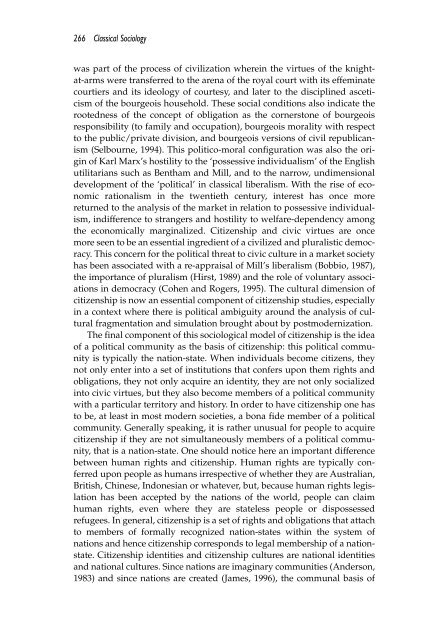You also want an ePaper? Increase the reach of your titles
YUMPU automatically turns print PDFs into web optimized ePapers that Google loves.
266 <strong>Classical</strong> <strong>Sociology</strong><br />
was part of the process of civilization wherein the virtues of the knightat-arms<br />
were transferred to the arena of the royal court with its effeminate<br />
courtiers and its ideology of courtesy, and later to the disciplined asceticism<br />
of the bourgeois household. These social conditions also indicate the<br />
rootedness of the concept of obligation as the cornerstone of bourgeois<br />
responsibility (to family and occupation), bourgeois morality with respect<br />
to the public/private division, and bourgeois versions of civil republicanism<br />
(Selbourne, 1994). This politico-moral configuration was also the origin<br />
of Karl Marx’s hostility to the ‘possessive individualism’ of the English<br />
utilitarians such as Bentham and Mill, and to the narrow, undimensional<br />
development of the ‘political’ in classical liberalism. With the rise of economic<br />
rationalism in the twentieth century, interest has once more<br />
returned to the analysis of the market in relation to possessive individualism,<br />
indifference to strangers and hostility to welfare-dependency among<br />
the economically marginalized. Citizenship and civic virtues are once<br />
more seen to be an essential ingredient of a civilized and pluralistic democracy.<br />
This concern for the political threat to civic culture in a market society<br />
has been associated with a re-appraisal of Mill’s liberalism (Bobbio, 1987),<br />
the importance of pluralism (Hirst, 1989) and the role of voluntary associations<br />
in democracy (Cohen and Rogers, 1995). The cultural dimension of<br />
citizenship is now an essential component of citizenship studies, especially<br />
in a context where there is political ambiguity around the analysis of cultural<br />
fragmentation and simulation brought about by postmodernization.<br />
The final component of this sociological model of citizenship is the idea<br />
of a political community as the basis of citizenship: this political community<br />
is typically the nation-state. When individuals become citizens, they<br />
not only enter into a set of institutions that confers upon them rights and<br />
obligations, they not only acquire an identity, they are not only socialized<br />
into civic virtues, but they also become members of a political community<br />
with a particular territory and history. In order to have citizenship one has<br />
to be, at least in most modern societies, a bona fide member of a political<br />
community. Generally speaking, it is rather unusual for people to acquire<br />
citizenship if they are not simultaneously members of a political community,<br />
that is a nation-state. One should notice here an important difference<br />
between human rights and citizenship. Human rights are typically conferred<br />
upon people as humans irrespective of whether they are Australian,<br />
British, Chinese, Indonesian or whatever, but, because human rights legislation<br />
has been accepted by the nations of the world, people can claim<br />
human rights, even where they are stateless people or dispossessed<br />
refugees. In general, citizenship is a set of rights and obligations that attach<br />
to members of formally recognized nation-states within the system of<br />
nations and hence citizenship corresponds to legal membership of a nationstate.<br />
Citizenship identities and citizenship cultures are national identities<br />
and national cultures. Since nations are imaginary communities (Anderson,<br />
1983) and since nations are created (James, 1996), the communal basis of

















